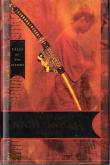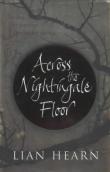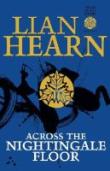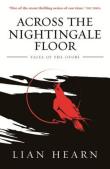AustLit
 7003672769347093573.jpg
7003672769347093573.jpg
Latest Issues
AbstractHistoryArchive Description
Australian Popular Medievalism
Notes
-
Dedication: For E
-
Listed in The New York Times Book Review's list of Notable Books for 2002.
Affiliation Notes
-
This work is affiliated with the AustLit subset Asian-Australian Children's Literature and Publishing because it has a Japanese setting and has been translated into Chinese and Japanese.
Publication Details of Only Known VersionEarliest 2 Known Versions of
Other Formats
- Sound recording (English and Swedish)
- Large print.
Works about this Work
-
From Middle Earth to Westeros : Medievalism, Proliferation and Paratextuality
2016
single work
criticism
— Appears in: New Directions in Popular Fiction : Genre, Distribution, Reproduction 2016; (p. 201-221)'This chapter argues that setting is a privileged aspect of the popular fantasy genre, and it analyses setting in terms of both how texts are created and how they are circulated and enjoyed. ‘Plot driven’ and ‘character driven’ are commonplace descriptions of modern fiction, and often mark a distinction between genres of differing value. While these phrases are most usually deployed in non-academic writing such as reviews and other opinion-based works, they have appeared in recent research around reading and empathy. According to Frank Lachmann, readers of so-called literary works scored higher in empathy tests than readers of popular fiction; he suggests that this is because empathy is more readily aroused by ‘character-driven’ fiction where ‘the emotional repertoire of the reader is enlarged’ than by ‘plot-driven’ fiction (2015, p. 144). I note that Lachmann makes no attempt to elaborate on what these phrases might specifically mean, nor is there any consideration of the ‘emotional repertoire’ of, say, romance fiction, which fits his definition of character driven and yet remains the most reviled of the popular genres. While, to my mind, good fiction needs to attend to both plot and character equally well, neither of these necessary aspects of storytelling comes readily to mind as a ‘driver’ when thinking about fantasy fiction. In fact, the big engine of the genre appears to be the exposition and elaboration of the setting, from which characterisation and plots specific to the setting are then generated. Fantasy novels are, in many ways, setting driven, a feature that marks them out as unique among popular genres. Other genres where setting is an acknowledged pleasure are historical fiction (for example the work of Philippa Gregory or Diana Gabaldon) and the exotic travel memoir (for example texts set in aspirational destinations such as Provence and Tuscany); but these at least rely on settings that are real. Fantasy fiction, on the other hand, invites readers to immerse themselves in and admire an incredibly detailed world that is an invention of the author’s imagination.' (Introduction)
-
Ernie Tucker on Books
2014
single work
review
— Appears in: English in Australia , vol. 49 no. 2 2014; (p. 98-112)
— Review of Snigger James on Grey 1999 single work novel ; Across the Nightingale Floor 2002 single work novel ; The Slightly True Story of Cedar B. Hartley (Who Planned to Live an Unusual Life) 2002 single work children's fiction -
Two Sides to the Question : Against
2008
single work
review
— Appears in: The Sydney Morning Herald , 1-2 March 2008; (p. 28)
— Review of Across the Nightingale Floor 2002 single work novel -
Two Sides to the Question : For
2008
single work
review
— Appears in: The Sydney Morning Herald , 1-2 March 2008; (p. 28)
— Review of Across the Nightingale Floor 2002 single work novel -
Re-Membering the Self : Psychoanalytic Theory and Subjectivity in Adolescent Fiction
2004
single work
criticism
— Appears in: Papers : Explorations into Children's Literature , May vol. 14 no. 1 2004; (p. 40-48)
-
[Review] Across the Nightingale Floor
2002
single work
review
— Appears in: Reading Time : The Journal of the Children's Book Council of Australia , November vol. 46 no. 4 2002; (p. 32)
— Review of Across the Nightingale Floor 2002 single work novel -
[Review] Across the Nightingale Floor
2003
single work
review
— Appears in: Fiction Focus : New Titles for Teenagers , vol. 17 no. 1 2003; (p. 23-24)
— Review of Across the Nightingale Floor 2002 single work novel -
[Review] Across the Nightingale Floor
2003
single work
review
— Appears in: Aurealis : Australian Fantasy & Science Fiction , no. 31 2003; (p. 143-144)
— Review of Across the Nightingale Floor 2002 single work novel -
Two Sides to the Question : For
2008
single work
review
— Appears in: The Sydney Morning Herald , 1-2 March 2008; (p. 28)
— Review of Across the Nightingale Floor 2002 single work novel -
Two Sides to the Question : Against
2008
single work
review
— Appears in: The Sydney Morning Herald , 1-2 March 2008; (p. 28)
— Review of Across the Nightingale Floor 2002 single work novel -
Across the Nightingale Floor by Lian Hearn
2003
single work
criticism
— Appears in: Viewpoint : On Books for Young Adults , Autumn vol. 11 no. 1 2003; (p. 3) -
Re-Membering the Self : Psychoanalytic Theory and Subjectivity in Adolescent Fiction
2004
single work
criticism
— Appears in: Papers : Explorations into Children's Literature , May vol. 14 no. 1 2004; (p. 40-48) -
Modesty and the Marketing Machine
2002
single work
column
— Appears in: The Sunday Age , 7 July 2002; (p. 8) -
As If By Magic
2002
single work
column
— Appears in: The Sydney Morning Herald , 24 August 2002; (p. 6-7) -
From Middle Earth to Westeros : Medievalism, Proliferation and Paratextuality
2016
single work
criticism
— Appears in: New Directions in Popular Fiction : Genre, Distribution, Reproduction 2016; (p. 201-221)'This chapter argues that setting is a privileged aspect of the popular fantasy genre, and it analyses setting in terms of both how texts are created and how they are circulated and enjoyed. ‘Plot driven’ and ‘character driven’ are commonplace descriptions of modern fiction, and often mark a distinction between genres of differing value. While these phrases are most usually deployed in non-academic writing such as reviews and other opinion-based works, they have appeared in recent research around reading and empathy. According to Frank Lachmann, readers of so-called literary works scored higher in empathy tests than readers of popular fiction; he suggests that this is because empathy is more readily aroused by ‘character-driven’ fiction where ‘the emotional repertoire of the reader is enlarged’ than by ‘plot-driven’ fiction (2015, p. 144). I note that Lachmann makes no attempt to elaborate on what these phrases might specifically mean, nor is there any consideration of the ‘emotional repertoire’ of, say, romance fiction, which fits his definition of character driven and yet remains the most reviled of the popular genres. While, to my mind, good fiction needs to attend to both plot and character equally well, neither of these necessary aspects of storytelling comes readily to mind as a ‘driver’ when thinking about fantasy fiction. In fact, the big engine of the genre appears to be the exposition and elaboration of the setting, from which characterisation and plots specific to the setting are then generated. Fantasy novels are, in many ways, setting driven, a feature that marks them out as unique among popular genres. Other genres where setting is an acknowledged pleasure are historical fiction (for example the work of Philippa Gregory or Diana Gabaldon) and the exotic travel memoir (for example texts set in aspirational destinations such as Provence and Tuscany); but these at least rely on settings that are real. Fantasy fiction, on the other hand, invites readers to immerse themselves in and admire an incredibly detailed world that is an invention of the author’s imagination.' (Introduction)
Awards
- 2004 winner Deutsche Jugendliteraturpreis — Preistrager Jugendjury
- 2004 nominated German Youth Literature Award — Young People's Prize Das Schwert in der Stille
- 2004 winner Deutsche Jugendliteraturpreis — Young People's Prize
- 2003 winner Australian Book Industry Awards (ABIA) — Bookseller Promotional Campaign of the Year
- 2003 shortlisted Yoto Carnegies Library Association Awards (UK) CILIP (Chartered Institute of Library and Information Professionals) Awards — Yoto Carnegie Medal for Writing
-
cJapan,cEast Asia, South and East Asia, Asia,














